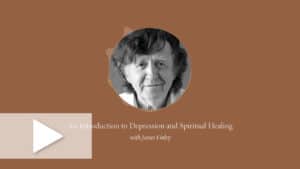
CAC teacher and psychotherapist James Finley describes basic signs of one widespread form of depression. If you or someone you love suffers from depression, we encourage you to seek help. [1]
As a psychotherapist, my task has been to diagnose, assess, and treat psychological symptoms that embody suffering. One of the most common categories of mental disorders are mood disorders. These are things such as anxiety and depression that impair our sense of feeling whole, free, and healed in our own lives.
The milder form of depression common today is known as dysthymia. There are many other forms. Symptoms for dysthymia are a persistent pattern of sadness or feeling empty and hopeless. It’s a long, slow, underlying chronic feeling, like there’s a great cloud over your head. In addition to feeling sad and empty inside, people often feel a sense of low energy and tiredness. Also, there are changes of appetite that usually show up as a loss of appetite but can also show up as overeating. There can be disturbance in sleep, either when someone wants to sleep all the time, or when someone is not able to sleep. These depressed moods last for most of the day. It’s these chronic, low grade, ongoing, long-standing feelings of depression, sadness, emptiness, loneliness, and so on.
Feelings of low self-esteem are also associated with dysthymia, feeling like I don’t matter, I don’t count, I’m “less than.” There is difficulty concentrating and problem solving. Symptoms can go away for a couple months at a time, but they tend to come back again. Dysthymic disorder, persistent depressive disorder, tends to respond very well to medical treatment. The optimal treatment is the combination between talk therapy and medication. [2]
Author Diana Gruver describes her felt experience of depression and return to well-being:
Those of us who suffer from depression call it many things. The fog. The black dog. The darkness. The unholy ghost. We dance around it with metaphors and paint pictures of the pain with our words. The word depression is too clinical, the list of symptoms too sterile.
Diagnostic guidelines cannot describe the sensation that your heart has stopped beating, has been torn from your chest, while your body continues to move mechanically, numb, without its lifeblood. I am a puppet. I am a ghost. I float invisible, unfeeling, watching the alive ones laugh and love. No mere definition can explain that feeling of emptiness, of isolation, of vacant pain….
I survived. With the help of therapy, medication, a good support system, and God’s grace, the light slowly dawned. Life gradually became easier, the days less daunting. My mind could focus and process once again. I could turn loving attention on other people. Sleep was no longer elusive. The sensation of joy once again took up residence in my heart.
I felt like one of the lucky ones—like I had barely survived my brush with depression’s darkness. I was thankful to be alive, returned once again to the sun. [3]
Reference:
[1] If you are or someone you know is in immediate danger, call 988 for the suicide and crisis lifeline, 911 for emergency services, or go to the nearest emergency room. For further resources on depression and spiritual healing, see: Depression Sourcebook, 5th ed. (2020); Monica A. Coleman, Not Alone: Reflections on Faith and Depression, and Bipolar Faith: A Black Woman’s Journey in Depression and Faith; James Finley, The Healing Path; Gerald G. May, Care of Mind, Care of Spirit: A Psychiatrist Explores Spiritual Direction; Barbara Cawthorne Crafton, Jesus Wept: When Faith and Depression Meet.
[2] Adapted from James Finley, “An Introduction to Depression and Spiritual Healing,” 2023 Daily Meditations: The Prophetic Path, Center for Action and Contemplation, April 4, 2023, video, 24:44.
[3] Diana Gruver, Companions in the Darkness: Seven Saints Who Struggled with Depression and Doubt (Downers Grove, IL: InterVarsity Press, 2020), 5, 4.
Image credit: A path from one week to the next—CAC Staff Exercise in Grief and Lamentation credits from left to right: Jennifer Tompos, Jenna Keiper, Jenna Keiper. Used with permission. Click here to enlarge image.
On retreat, the CAC staff used watercolors to connect to our collective grief. This is one of the watercolor paintings that came from that exercise.
Story from Our Community:
I grew up with a sweet Irish father who was also an alcoholic and a mother who suffered from schizophrenia. Raised Roman Catholic, I was taught that in order to “earn salvation” we had to be sinless and perfect. I grew up believing I would wind up in hell because I was far from perfect. My Dad was my safe place as a child because my Mother often raged at me. But my Dad was also often gone and I never knew when he would come home to “save” me. I have come to understand that at age 79, I have finally been given the grace to feel my deep grief at being abandoned by my Dad. It is a deeply painful experience, but I’m slowly accepting that that God is not the rigid, demanding judge I was told about, but a gentle, loving, and healing entity who exists within me; healing me from the inside out. The Daily Meditations are giving me deep comfort and the grace to be patient, let go, and allow my Higher Power to bring me through the transition to the other side. —Mary W.





